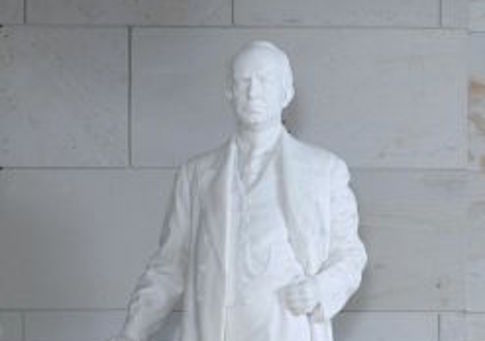There is a push by Republicans in the Arkansas legislature to replace the statues that have represented the state in the U.S. Capitol for the past century. But one of the statues they want removed happens to be related to Arkansas Democrat Clarke Tucker, leading him to charge Republicans pushing for its removal with "petty politics."
Each state has two statues in the Capitol in Washingon, D.C., and Arkansas has debated changing its statues since Congress began allowing for changes in 2000, according to the Arkansas Democrat-Gazette. The state is currently represented by Uriah Rose, founder of the Little Rock-based Rose Law Firm and, more controversially, James Paul Clarke, a former governor and senator who fought for white supremacy to remain the key doctrine of the Democratic Party.
Clarke is the great-great-grandfather of Democratic state lawmaker Clarke Tucker, who first spoke out against removing the statue when it was proposed in 2014.
"That's who I was named for," Tucker said at the time, explaining that he first visited the statue when he was 13 and that it is a family tradition to take a picture with it. "It definitely means a lot to our family."
Now Tucker is running for Congress, a move he thinks brought about the push to remove the statue, saying it "shows how petty politics can be."
Bart Hester, the Republican leading the charge to have the statues replaced, told the Free Beacon that his decision to make the move a legislative priority of his was made more than a year before Tucker even announced his run.
"I decided to take the lead on changing the statues 13 months before Tucker announced he was running for Congress," Hester said. "It had nothing to do with his run at all."
Hester, the senate majority leader in Arkansas, said his Democrat counterpart has accused him of playing politics. His actual goal, however, is for Arkansans visiting the nation's capital to have something they could be proud to visit.
"I want every family that comes to D.C. to be able to see the statues representing our state and be proud of those people," Hester said.
Hester's proposal is for the state to be represented by a member of the "Little Rock Nine," the African-American students who needed a military escort to attend desegregated high school in 1957, and by Adam Brown, a Navy SEAL killed in Afghanistan who Hester thinks would represent all the Arkansans who have lost their lives in the line of duty.
Hester says the instant he resurfaced the issue this year he started to get other recommendations, including one call for a statue of Arkansas-born musician Johnny Cash, proving to him this is something people are receptive to.
"This has been a debate and an argument we've been having for years, and just because Clarke Tucker is running for office doesn't mean we have to stop talking about it," Hester said.
Hester has thus far stayed away from entering Clarke's racist views into the debate over the statue, but entering them into the discussion would help his case.
According to the Encyclopedia of Arkansas History & Culture, Clarke was "a defender of white supremacy as the key doctrine of his party."
In one of his most well known speeches he said, "The people of the South looked to the Democratic party to preserve the white standards of civilization."
Clarke Tucker still holds his great-great-grandfather in high regard, even "proudly featuring" a large portrait of him above the desk in his home office, which was showcased in a magazine profile in 2016.
There have been numerous legislative proposals to have the statues replaced since the first attempt in 2001, but none have garnered enough support to advance to the floor.
Hester says Tucker's objections won't impact his legislation and he "would be shocked if we don't get it done in the coming session."
The Arkansas Democratic Party last summer came out in support of removing Confederate monuments and "objects that romanticize the darkest days of our history."
Tucker's campaign did not respond to a request for an interview on the issue of the statues.
